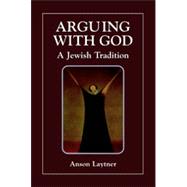| Acknowledgment |
|
xi | (2) |
| The Law-Court Pattern of Prayer: An Introduction and an Overview |
|
xiii | |
| Biblical Roots |
|
xiii | (3) |
| The Covenantal Relationship |
|
xvi | (1) |
| The Law-Court Pattern of Prayer |
|
xvii | (1) |
| The Uniqueness of Hebrew Prayer |
|
xviii | (1) |
| A Comparison with the Greeks |
|
xix | (1) |
| The Law-Court Pattern throughout Jewish History |
|
xx | |
| PART I |
|
3 | (112) |
|
1. Arguing with God in the Bible |
|
|
3 | (38) |
|
|
|
3 | (1) |
|
|
|
3 | (5) |
|
|
|
8 | (7) |
|
|
|
15 | (1) |
|
|
|
16 | (6) |
|
Psalms of Petition and the Book of Lamentations |
|
|
22 | (10) |
|
|
|
32 | (6) |
|
|
|
38 | (3) |
|
2. Rabbinic Use of Biblical Arguments |
|
|
41 | (28) |
|
|
|
41 | (1) |
|
The Rabbinic Model of the Law-Court Pattern |
|
|
42 | (2) |
|
The Role of the Law-Court Aggadah |
|
|
44 | (1) |
|
Abraham's Aggadic Arguments with God |
|
|
45 | (4) |
|
|
|
49 | (8) |
|
Arguments against the Human Condition |
|
|
57 | (9) |
|
|
|
66 | (3) |
|
3. Arguments against the Exile |
|
|
69 | (18) |
|
|
|
69 | (3) |
|
The Arguments of Knesset Yisrael |
|
|
72 | (4) |
|
The Arguments of the Ancestors in Heaven |
|
|
76 | (6) |
|
Rabbinic Responses to the Exile |
|
|
82 | (5) |
|
4. Personal Law-Court Prayers in the Rabbinic Period |
|
|
87 | (16) |
|
|
|
87 | (6) |
|
Responses to Personal Argumentative Prayers |
|
|
93 | (5) |
|
Rabbinic Opposition to Miracles |
|
|
98 | (2) |
|
|
|
100 | (3) |
|
5. Excursus on a Bird's Nest |
|
|
103 | (12) |
|
|
|
103 | (1) |
|
|
|
104 | (2) |
|
The Challenge of Gnosticism |
|
|
106 | (2) |
|
Akiba's Understanding of Divine Justice |
|
|
108 | (2) |
|
|
|
110 | (5) |
| PART II |
|
115 | (116) |
|
6. Argument Motifs in the Statutory Liturgy |
|
|
115 | (12) |
|
Conflicting Attitudes to Suffering and the Triumph of Akiba's View |
|
|
115 | (2) |
|
The Quoting God's Words Back to Him Motif |
|
|
117 | (3) |
|
Past Arguments, Past Precedents, and the Merit of the Ancestors Motifs |
|
|
120 | (5) |
|
Petitions with a Conditional Element |
|
|
125 | (1) |
|
|
|
126 | (1) |
|
7. Poetry as Prayer and Protest |
|
|
127 | (50) |
|
The Origins and Development of Piyyutim |
|
|
127 | (2) |
|
Piyyutim of Protest: Keva and Kevanah |
|
|
129 | (2) |
|
|
|
131 | (1) |
|
How a Piyyut of Protest Works |
|
|
132 | (7) |
|
Long-Suffering in Her Love |
|
|
139 | (2) |
|
Israel's Life in Exile: "Behold Our Plight" |
|
|
141 | (4) |
|
The Struggle to Comprehend and to Speak |
|
|
145 | (4) |
|
|
|
149 | (2) |
|
|
|
151 | (2) |
|
|
|
153 | (3) |
|
Where Are Your Miracles Now? |
|
|
156 | (1) |
|
|
|
157 | (1) |
|
Accusations and Hostility to God |
|
|
157 | (2) |
|
The Merit of the Ancestors Motif |
|
|
159 | (1) |
|
|
|
160 | (2) |
|
The Past Precedents Motif |
|
|
162 | (1) |
|
The Quoting God's Words Back to Him Motif |
|
|
163 | (3) |
|
Israel, the Faithful Wife |
|
|
166 | (2) |
|
Petitions for Justice and Revenge |
|
|
168 | (3) |
|
|
|
171 | (3) |
|
|
|
174 | (3) |
|
8. Argument with God in the Eastern European Tradition |
|
|
177 | (54) |
|
|
|
177 | (2) |
|
|
|
179 | (10) |
|
Yiddish Folksongs and Poetry of Protest |
|
|
189 | (7) |
|
Poetry of the Holocaust and After |
|
|
196 | (18) |
|
The Prose Arguments of Elie Wiesel |
|
|
214 | (13) |
|
|
|
227 | (4) |
|
Personal Afterword: What Arguing with God Means for Me |
|
|
231 | (18) |
|
|
|
231 | (1) |
|
|
|
232 | (9) |
|
Toward an Understanding of the Task |
|
|
241 | (6) |
|
A Story on the Task at Hand |
|
|
247 | (2) |
| Notes |
|
249 | (48) |
| References |
|
297 | (12) |
| Index |
|
309 | |

